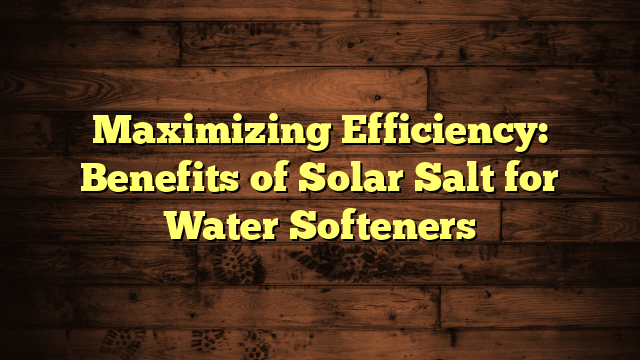Maximizing Efficiency: Benefits of Solar Salt for Water Softeners
You might not realize it, but the choice of salt for your water softener can greatly impact efficiency and performance. Solar salt, derived from natural evaporation, offers distinct advantages over traditional salts, including improved purity and solubility. This means clearer water and less scale buildup, which can save you time and maintenance costs. Plus, its longer-lasting properties can lead to unexpected savings. Curious about how these benefits stack up against conventional options? Let's explore the details that can help you make a more informed decision.
Key Takeaways
- Solar salt contains fewer impurities, enhancing water clarity and improving overall softening efficiency in water softeners.
- Its higher solubility ensures efficient dissolution, reducing clogs and maintenance issues in softening systems.
- The eco-friendly production process lowers the carbon footprint, promoting sustainability in household water treatment.
- Longer-lasting in water softeners, solar salt decreases refill frequency and associated costs, offering long-term savings.
- Improved mineral balance prevents harmful scale buildup, protecting plumbing and appliances for better system performance.
What Is Solar Salt?
Solar salt, often referred to as solar evaporated salt, is a natural mineral product derived from seawater or salt brines. You might be surprised to learn that solar salt production involves a fascinating process called solar evaporation.
In this method, seawater is channeled into shallow ponds where sunlight and wind work together to evaporate the water over time. As the water evaporates, salt crystals form and settle at the bottom. This process can take weeks or even months, depending on weather conditions and local climate.
Once the salt has crystallized, it's harvested, washed, and processed to guarantee it's free of impurities. The resulting product is often coarse and has a natural, clean taste, making it a popular choice for various applications.
As you consider using solar salt in your water softener, remember that its production is eco-friendly and energy-efficient. By harnessing the sun's power, you're choosing a sustainable option that benefits both your home and the environment.
With its high purity and effectiveness, solar salt is an excellent choice for maintaining your water softener's performance and longevity.
Environmental Benefits
When you choose solar salt for your water softener, you're making a choice that benefits the environment.
This sustainable resource reduces chemical pollution, helping to keep our water sources cleaner.
Plus, by lowering your carbon footprint, you contribute to a healthier planet for future generations.
Reduced Chemical Pollution
Using solar salt in water softeners markedly reduces chemical pollution, benefiting both your home and the environment. Traditional water softeners often rely on sodium chloride that can contribute to chemical runoff. This runoff, in turn, can lead to groundwater contamination, affecting not just your water supply but also local ecosystems.
By opting for solar salt, you're choosing a cleaner alternative that minimizes these harmful effects. Solar salt is derived from evaporated seawater, which means it's a more natural resource compared to other sodium sources. When you use solar salt, you're not just softening your water; you're also reducing the risk of introducing unnecessary chemicals into your local waterways.
This decision helps maintain cleaner water systems and supports the health of aquatic life. Moreover, using solar salt can lessen the strain on wastewater treatment facilities, which often struggle with the influx of chemicals from traditional salts.
Sustainable Resource Utilization
In recent years, the shift towards solar salt for water softeners has highlighted the importance of sustainable resource utilization. By harnessing the power of sustainable energy, solar salt production minimizes environmental impact while promoting resource conservation.
Unlike traditional salt mining, which can deplete natural resources and damage ecosystems, solar salt is derived from evaporating seawater or brine in solar ponds. This method not only conserves freshwater resources but also requires considerably less energy, making it an eco-friendly alternative.
When you choose solar salt, you're actively supporting a process that utilizes renewable energy sources, reducing dependence on fossil fuels. This approach contributes to the health of our planet, helping to maintain its delicate balance.
Furthermore, by opting for solar salt, you're participating in a larger movement toward sustainable practices that prioritize long-term environmental health over short-term gains.
Incorporating solar salt into your water softening system means you're not just improving your home's water quality; you're also making a conscious choice that benefits the environment.
Embracing sustainable resource utilization is a step toward a greener future, ensuring that resources are available for generations to come.
Lower Carbon Footprint
How can switching to solar salt help lower your carbon footprint? By choosing solar salt for your water softener, you're embracing sustainable practices that notably reduce environmental impact.
Traditional salt mining can be energy-intensive, contributing to higher carbon emissions. In contrast, solar salt is harvested through evaporation, a process that uses natural sunlight and requires minimal energy. This method not only conserves resources but also results in energy savings that benefit both your wallet and the planet.
When you opt for solar salt, you're making a conscious decision to support eco-friendly alternatives. The lower energy consumption associated with its production means fewer fossil fuels are burned, directly leading to a reduction in greenhouse gas emissions.
Furthermore, using solar salt can improve your water softener's efficiency, which further enhances its sustainability.
Incorporating solar salt into your routine isn't just a smart choice for your home; it's a step toward a healthier environment. By making this switch, you're actively participating in the global effort to combat climate change and promote a greener future.
Cost-Effectiveness
When it comes to water softeners, solar salt stands out as a cost-effective solution for many households. By choosing solar salt, you can reap significant cost savings while making a long-term investment in your home's water quality.
Here are some reasons why solar salt is a smart financial choice:
- Lower Cost: Solar salt is often more affordable than other salt types, helping you save money on your monthly expenses.
- Longer Lasting: It typically lasts longer in your water softener, reducing the frequency of refills and lowering your overall costs.
- Reduced Maintenance: Using solar salt can lead to fewer repair issues, saving you from costly maintenance fees.
- Energy Efficiency: The production process of solar salt is energy-efficient, which can translate into lower utility bills for you.
- Versatile Use: It works well in various water softeners, giving you flexibility without compromising effectiveness.
Investing in solar salt not only benefits your wallet but also contributes to a more sustainable environment.
Improved Water Quality
Choosing solar salt not only saves you money but also greatly enhances your water quality. When you use solar salt in your water softener, you'll notice a remarkable improvement in water clarity. Unlike other types of salt, solar salt is harvested through the natural evaporation of seawater. This process results in fewer impurities, meaning you get cleaner water straight from your taps.
Additionally, solar salt helps maintain a balanced mineral profile in your water. This mineral balance is essential for preventing the buildup of harmful scale in your plumbing and appliances. With fewer minerals present, you'll enjoy softer water that feels better on your skin and hair. It also helps to protect your fixtures and appliances, extending their lifespan.
Moreover, the improved water quality can have a positive impact on your daily activities, from washing dishes to doing laundry. You'll find that your soap and detergents work more effectively, leading to cleaner clothes and dishes.
Ultimately, switching to solar salt means you're investing in both your health and your home, ensuring you enjoy the best quality water possible.
Enhanced Water Softening Process
The enhanced water softening process with solar salt greatly boosts the efficiency of your water softener. By switching to solar salt, you'll notice improved efficiency and enhanced performance in your system.
This natural product not only softens water more effectively but also offers several key benefits:
- Higher Purity: Solar salt contains fewer impurities, leading to better results.
- Cost-Effective: You'll often find solar salt to be more affordable over time.
- Less Maintenance: Fewer salt bridges and clogs mean less hassle for you.
- Better Longevity: Your water softener can last longer with the right salt.
- Eco-Friendly: Opting for solar salt supports sustainable practices.
With these benefits, you can expect your water softener to work smarter, reducing the need for frequent regenerations.
As a result, your home will enjoy softer water, and you'll experience less scale buildup in your appliances and plumbing.
Embracing solar salt not only enhances the performance of your water softener but also contributes to overall household efficiency.
Easy Maintenance
With solar salt, maintaining your water softener becomes a breeze. The user-friendly process guarantees that you won't have to spend hours deciphering complicated maintenance routines.
Unlike traditional salts, solar salt requires minimal upkeep, allowing you to focus on other important tasks in your home. Simply check the salt level every few weeks, and refill as needed.
Solar salt dissolves more efficiently, resulting in fewer clogs and blockages in your system. Its purity means you won't have to deal with the impurities often found in other types of salt, which can lead to a messy softener and more frequent cleaning.
Additionally, you won't need to worry about corrosion or buildup that can affect performance and longevity. This means you can extend the life of your water softener without the added hassle of constant maintenance.
Comparison With Traditional Salts
When you compare solar salt to traditional salts, you'll quickly notice several key differences that can impact your water softening experience. Understanding these can help you make an informed choice for your home.
Here are some benefits of solar salt advantages when put against traditional salt:
- Purity: Solar salt typically contains fewer impurities, resulting in cleaner water.
- Solubility: It dissolves more efficiently, ensuring your system operates smoothly.
- Cost-Effectiveness: While initial costs may vary, solar salt can lead to savings over time due to its efficiency.
- Environmental Impact: Harvested through natural evaporation, solar salt is a more eco-friendly option compared to mined salts.
- Less Maintenance: With fewer clogs and buildup, solar salt can reduce the need for frequent maintenance.
In this traditional salt comparison, you'll find that choosing solar salt can enhance your water softening process while also being kinder to the environment.
By opting for solar salt, you're not just investing in cleaner water; you're also making a choice that benefits your system and the planet.
Frequently Asked Questions
How Is Solar Salt Produced Compared to Other Salts?
Solar salt production involves evaporating seawater or brine in shallow ponds under the sun. This natural evaporation process distinguishes it from other salts, which are often mined or harvested through more energy-intensive methods.
Can I Use Solar Salt in All Water Softeners?
Can you really use solar salt in any water softener? Most systems accept it, but some may require specific types. Consider solar salt advantages for efficiency, but always check your softener's compatibility to avoid issues.
Does Solar Salt Have Any Additives?
Solar salt typically doesn't have additives, ensuring high purity. Some brands might include anti-caking agents, but these aren't common. Always check the label to confirm the additive types if you're concerned about purity.
How Often Should I Replace Solar Salt?
You should check your salt storage regularly and replace solar salt every 4 to 6 weeks, depending on usage. This replacement frequency guarantees ideal performance and prevents salt bridges from forming, which can hinder your water softener's efficiency.
Is Solar Salt Safe for Drinking Water Systems?
Yes, solar salt is safe for drinking water systems. It meets strict standards for drinking safety, ensuring your water quality remains high. Just make sure to follow manufacturer guidelines for ideal results in your system.
Conclusion
Incorporating solar salt into your water softening routine is a smart move that pays off in more ways than one. With its enhanced purity, cost savings, and eco-friendly benefits, you're not just improving your water quality; you're also making a wise investment for the future. By choosing solar salt, you're hitting two birds with one stone: enjoying cleaner, softer water while easing maintenance. So, why not give it a shot and experience the difference for yourself?







